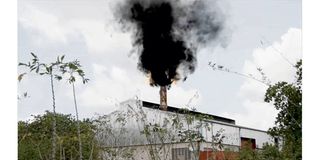Tighter control needed over hazardous waste handling

A hospital waste incinerator in operation at Dundani Village in a 2017 photo. Residents living close to the facility had raised an alarm over potential risks to public health and environment caused by the heavy smoke produced by the plant. There are concerns that poor management of hazardous waste is putting public health at risk in Tanzania. PHOTO | FILE
What you need to know:
- Experts are worried that poor management of hazardous waste due to lack of proper know how is causing a lot of problems to public health
Dar es Salaam. Lack of proper management and disposal of hazardous waste at both institutional and community levels are a cause for concern particularly to public health, The Citizen can report.
In an interview on Thursday in the city, an expert said the public lacked proper knowledge on how to safely handle medical and hazardous goods as well as how to dispose of the resultant waste, something that continues to endanger the lives of people, especially children.
The expert warned that more and more such substances continued to reach hands of institutions and households from various sources like health facilities, pharmacies, industries, and mining sites.
They include medical waste, explosives and chemicals in liquid, solid and gaseous forms, all of which need proper know how and strategies so as to handle them safely and efficiently.
The expert noted that proper education was the only way to help the government to fulfil the promise it made in the COP26 towards reducing harmful emissions as a way to deal with the impacts of climate change.
The matter was one of more than 22 issues debated during the 9th Tanzania Health Summit 2022 held in Dar es Salaam from October 11 to October 13, 2022, bringing together both local and international health sector stakeholders, environmentalists and government officials.
This year’s event was themed ‘Quality of Healthcare in Tanzania: The Current Status and Areas of improvement toward achieving Health Sector Strategic Plan (HSSP V).
Mr Charles Luvubhu from Tindwa Medical and Health Services limited (TMHS) told The Citizen that hazardous waste management required more efforts to contain.
“In just seven years, we have collected and disposed of more than 10,000 tonnes of metal, medical, industrial, cosmetics, chemical and pharmaceutical biohazard waste across the country,” he noted.
“People are collecting waste and burning it regardless of its effects. This situation is very dangerous and it must serve as a wakeup call to both private and public sector stakeholders to come up with strategies to curb the situation,” he noted.
He said that TMHS, which led the forum in deliberating on the challenges caused by hazardous waste and how to deal with them, was guided by the sub-theme: “Promotion of waste management initiatives for environmental sustainability and climate action.”
“In the past, hazardous waste management had not been accorded its due importance and recognition essentially because of a low-level of awareness among the people, financial and technical constraints,” the Waste and Environment manager at TMHS told The Citizen in an interview.
“This is one of the alarming challenges. People live with expired medicines and they don’t know where to take them, thus throwing them alongside food waste. We need to end this menace in collaboration with the government institutions through provision of proper education on the matter,” he said.
Also Read:
Existing reports have it that of the total amount of waste generated by health-care activities, about 85 percent is general, that is, non-hazardous waste, comparable to domestic waste. The remaining 15 percent is considered hazardous material that may be infectious, chemical or radioactive.
Health-care waste contains potentially harmful microorganisms that can infect hospital patients, health workers and the general public.
Other potential hazards may include drug-resistant microorganisms which spread from health facilities into the environment.
Mr Moses Katuro, an employees of Delmat Global Company that deals with waste management said that he has often come across medical waste including injections, medicine bottles and many masks that were used during Covid-19 pandemic.
“The truth is that in a city like Dar (Dar es Salaam) hazardous waste is too much because people at home do not know where to take it and many believe that all waste is to be treated the same. We find many injections in the garbage we collect from households,” he said.
He said that the situation was also evident in the rivers as well as along the beach and it was dangerous even for the waste collectors. “This forces us to separate common and hazardous waste.”
Through the Environmental Management (Hazardous Waste Control and Management) Regulations, 2019, the government has specified the manner and what all institutions involved in the collection of hazardous waste are required to do to ensure safety for the community, this includes hospitals.
The government has also issued a procedure that everyone who starts a healthcare facility anywhere in the country must prove that they have a consultant with expertise and proper methodology of collecting and destroying hazardous waste.
Mr Luvubha said that following the government’s guidelines on hazardous waste and achieving the goals of eliminating hazardous waste, they have started services that will make people stop burning hazardous waste locally.
“The existing strategies are to ensure that even if there will be emissions from waste, then it will be at a very small level, and through the modern elimination of such waste it is possible,” he noted.
The management of health-care waste requires increased attention and diligence to avoid adverse health outcomes associated with poor practice, including exposure to infectious agents and toxic substances.
“The challenge our country was facing in improperly disposed biohazard waste inspired us to look into ways to do safe disposal and make our country safe for the future generations,” Mr Luvubha noted.




